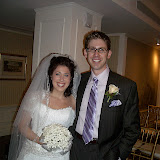 So... my sister is married!
So... my sister is married!Though I have lost count of the weddings that I've attended and solemnized, it was the first time I had attended (let alone participate in) an Orthodox Jewish wedding ceremony.
The Orthodox certainly get it right, in many ways, when it comes to celebrating a simcha - the ceremony should make people feel happy! Many people commented to me on the ruach (spirit) of the ceremony. A traditional Jewish wedding declares unadulterated joy.
Every stage of the ceremony is accompanied by dancing and singing. The guests are not to be polite observers; it is a mitzvah for them to make the groom and bride happy. All manner of silliness, merriment, music, and motion are encouraged to keep the bride and the groom smiling from the moment they walk to the chuppah until the celebration is over and everyone presumably passes out from exhaustion.
We began with a few shots of scotch for which I was grateful, because it eased a little bit of the tension. It should be noted that while the ceremony was conducted in accordance with Orthodox halakha (Jewish law), the actual number of guests who affiliate "Orthodox" was a scant handful - and many of the Reform, Conservative, and unaffiliated Jews in attendance (to say nothing of the non-Jewish guests) were a bit uncomfortable (it appeared to me) when they saw the large stack of siddurim (prayer books) waiting behind the mekhitza (room divider) for the short prayer service that would be conducted (among the men only -- women are not counted in an Orthodox minyan).

After the service, we proceed to the ritual of tena'im (the formal agreement made before a betrothal - solemnized in the presence of two witnesses, and ritually concluded by the exchange of a handkerchief (a legal formality) and the breaking of a plate by the mothers of bride and groom (symbolizing that just as a broken vessel cannot be repaired, so too with a broken engagement)). My Mom was a basket case beforehand, fretting about breaking the plate. Using a hammer (dressed up in gold ribbon - hilarious), the Moms acquitted themselves with excellence and smashed the hell out of the poor thing.

With the plate broken and the scotch working its amber magic, we proceeded to the signing of the ketubah (Jewish wedding contract). Rabbi Eric "Shmuel" Ertel and Rabbi Mordecai Katz witnessed the ketubah. Halahkah declares that two Jewish witnesses unrelated to the bride or groom are required to validate a ketubah. Many Orthodox rabbis further clarify that only shomer-Shabbat, shomer-Kashrut (Sabbath and Kosher-observant) Jews may witness a ketubah. So - by this standard, the most qualified men in the house fulfilled the obligation.
We danced Dean (the groom) down the aisle to the words Od yishama b'arei Yehuda u'v'chutzot Yerushalayim kol sason v'kol simcha, kol chatan v'kol kallah - "Let there yet be heard in the cities of Judah and the streets of Jerusalem, the sound of joy and gladness, the voice of groom and bride." And lots of clapping.
A processional followed, with bride circling groom seven times (a mystical and murky custom that some say symbolizes the revolutions of the earth during the seven days of creation, or perhaps simply a Kabbalistic way of "fastening" the bride to her groom?), the opening prayers, the blessing of betrothal, the pronouncing of the vow and exchanging of the ring (groom-to-bride), a few remarks by me, the sheva berakhot (Seven Wedding Benedictions, here recited by various guests), and, of course, the breaking of a glass.
I've been reflecting on the weekend from the standpoint of a Reform rabbi. Probably the most important realization I've had, professionally speaking, is how important it is for Reform rabbis to feel comfortable and conversant in Orthodox ritual, tradition, and law. I felt that from the time I met Shmuel (Rabbi Ertel), he treated me with respect and collegiality. I'm sure that much of this is because he's a nice guy, but I think it also helped that I arrived to our pre-planning meeting with my Orthodox Rabbi's manual in hand (same one he uses) and that throughout the weekend I demonstrated my comfort and competence in Orthodox practice (from bensching the full birkat ha-mazon (blessing after meals) to davenning a traditional service, etc. etc.). With regret I can tell you that many Reform rabbis do not avail themselves of opportunities to become comfortable in Orthodox settings - in my opinion, to their detriment both personally and professionally. Some seem intimidated; others simply unmotivated; and still others take their principled rejection of Orthodoxy (e.g., its non-egalitarian stance toward women, gays, etc.) to the point of stridency or mutual exclusion.
In my view, this is a big mistake for a Jewish leader, even the most principled Reform Jewish leader. It's not that I think we should kowtow to the demands of the Orthodox. (Read enough of this blog and I'm sure my rejection of Orthodoxy will become evident.) And it's not that I think Orthodoxy should define normative Judaism for the world's Jewish population (it shouldn't, in my view, and it doesn't, strictly in terms of numbers). However, in the name of Klal Yisrael -- the worldwide community of the Jewish people -- and the belief that what unites us far exceeds what divides us -- I would urge all Reform rabbis and rabbinical students to familiarize themselves and become comfortable in Orthodox settings, at least so that they can participate fully in all expressions of Jewish life. Feeling confident and competent in an Orthodox setting may also earn you respect outside the liberal Jewish world, where it is not usually freely given (sight unseen) to non-Orthodox Jews. At the very least, shouldn't a Reform rabbi be able to represent more than his or her own limited contingency?
Mazal Tov to the happy couple!
You can view pictures from the wedding weekend here:



